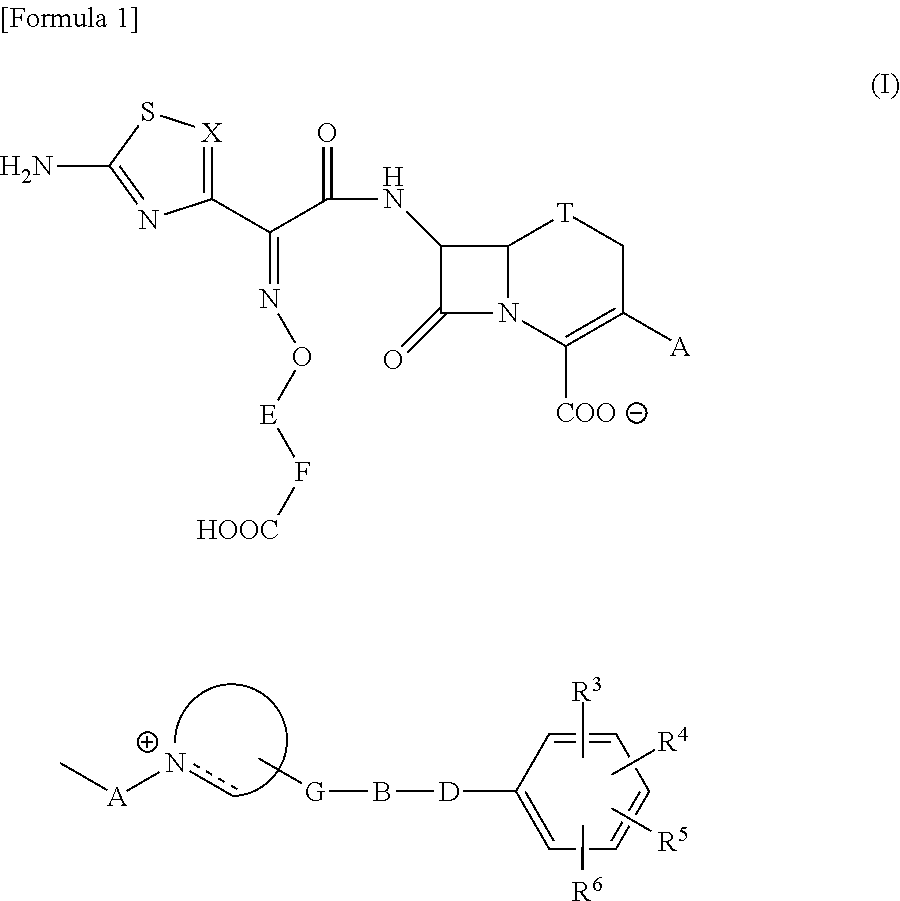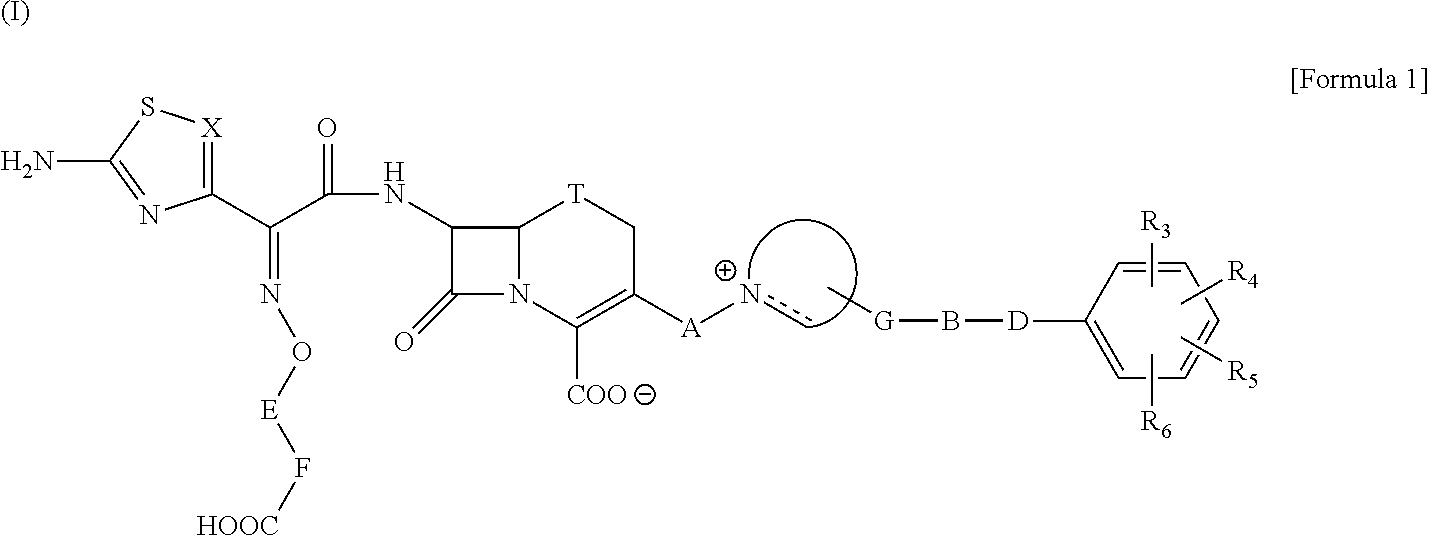Cephalosporin having catechol group
- Summary
- Abstract
- Description
- Claims
- Application Information
AI Technical Summary
Benefits of technology
Problems solved by technology
Method used
Image
Examples
example 1
Synthesis of Compound (I-1)
[0219]
Step (1) Compound 1→Compound 2
[0220]A suspension of Compound 1 (10.83 g, 50 mmol) in dichloromethane (100 mL) was cooled to 0° C., and then BBr3 (18.91 ml, 200 mmol) was added drop-wise thereto over 15 minutes. It was stirred at 0° C. for 15 minutes and then at room temperature for 3 hours. The reaction mixture was poured into 2M hydrochloric acid containing ice, followed by adding AcOEt and THF thereto, and then dichloromethane was evaporated under reduced pressure, subsequently separating the solution. The organic layer was washed with water two times, washed with saturated brine, and then dried over MgSO4. MgSO4 was removed by filtration, and then concentration and drying in vacuo yielded Compound 2 as a pale orange powder (5.46 g, 58% yield).
Compound 2:
[0221]1H-NMR (DMSO-d6) δ (delta): 6.78 (1H, d, J=8.4 Hz), 7.24 (1H, d, J=8.1 Hz), 9.28 (1H, br), 10.38 (1H, br), 12.56 (1H, br).
Step (2) Compound 2→Compound 3
[0222]To a solution of Compound 2 (5.43...
example 2
Synthesis of Compound (I-2)
[0234]
Step (1): Compound 9→Compound (I-2)
[0235]To Compound 9 (3.55 g, 4 mmol) and Compound 10 (1.96 g, 4 mmol) was added DMF (10 mL) to dissolve them, followed by stirring at room temperature for 3.5 hours. DMF (20 mL) was further added thereto, followed by cooling to −40° C., and then potassium iodide (4.65 g, 28 mmol) and AcCl (1.14 ml, 16 mmol) were added thereto, subsequently stirring at 0° C. for 1 hour. The reaction solution was poured into ice water and AcOEt, and then the solution was separated. After one-time extraction from the aqueous layer with AcOEt, the organic layer was washed with water, and then washed with saturated brine. The organic layer was dried over MgSO4, followed by MgSO4 was removed by filtration, and then concentration and subsequent drying in vacuo yielded Compound 13 as a reddish brown oil. This was used for the next reaction without purification.
[0236]The whole amount of Compound 11 obtained was dissolved in dichloromethane (...
example 3
Synthesis of Compound (I-3)
[0241]
Step (1): Compound 12→Compound 13
[0242]To a solution of Compound 12 (2.23 g, 10 mmol) in DMF (22 mL) was added K2CO3 (4.84 g, 35 mmol), PMBCl (5.45 ml, 40 mmol), and potassium iodide (1.5 g, 10 mmol) in turn, followed by stirring at 70° C. for 1 hour. The reaction solution was cooled to room temperature, and then poured into ice water and AcOEt, followed by separating the solution. After one-time extraction from the aqueous layer with AcOEt, the organic layer was washed with water, and then washed with saturated brine. The organic layer was dried over MgSO4, subsequently MgSO4 was removed by filtration, and then concentrated. The crude product was purified by flash column chromatography to yield Compound 13 as a pale yellow liquid (5.37 g, 92% yield).
Compound 13:
[0243]1H-NMR (CDCl3) δ (delta): 3.816 (3H, s), 3.823 (3H, s), 3.83 (3H, s), 4.97 (2H, s), 5.05 (2H, s), 5.29 (2H, s), 6.86-6.93 (6H, m), 7.33-7.41 (6H, m), 7.65 (1H, s).
Step (2): Compound 13→...
PUM
| Property | Measurement | Unit |
|---|---|---|
| Force | aaaaa | aaaaa |
| Antimicrobial properties | aaaaa | aaaaa |
Abstract
Description
Claims
Application Information
 Login to View More
Login to View More - R&D
- Intellectual Property
- Life Sciences
- Materials
- Tech Scout
- Unparalleled Data Quality
- Higher Quality Content
- 60% Fewer Hallucinations
Browse by: Latest US Patents, China's latest patents, Technical Efficacy Thesaurus, Application Domain, Technology Topic, Popular Technical Reports.
© 2025 PatSnap. All rights reserved.Legal|Privacy policy|Modern Slavery Act Transparency Statement|Sitemap|About US| Contact US: help@patsnap.com



